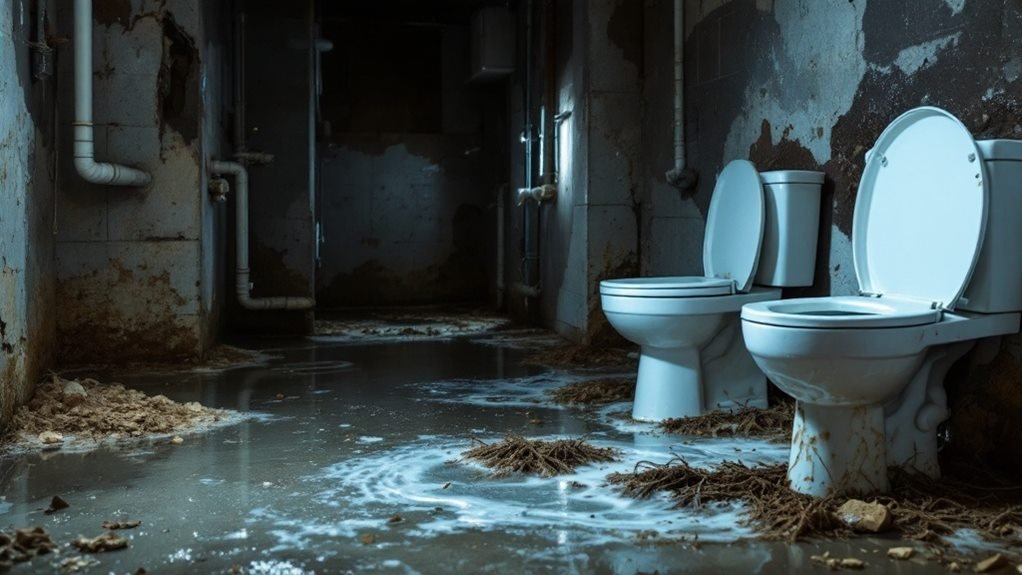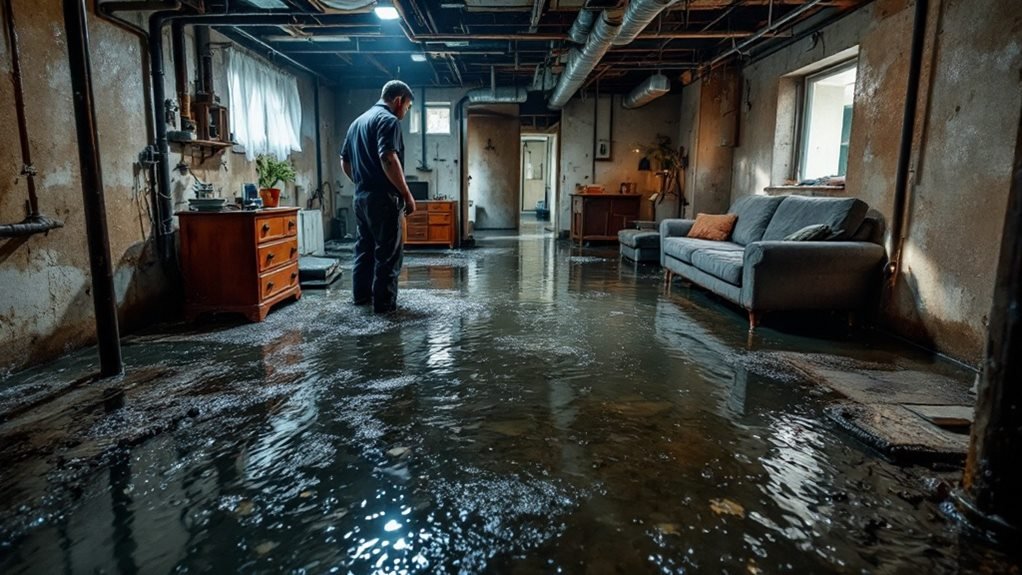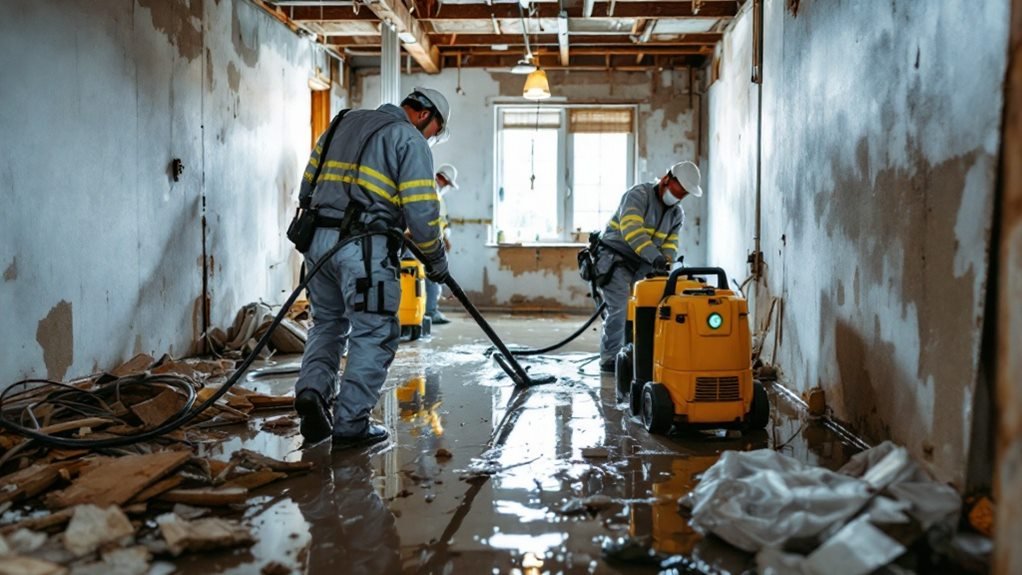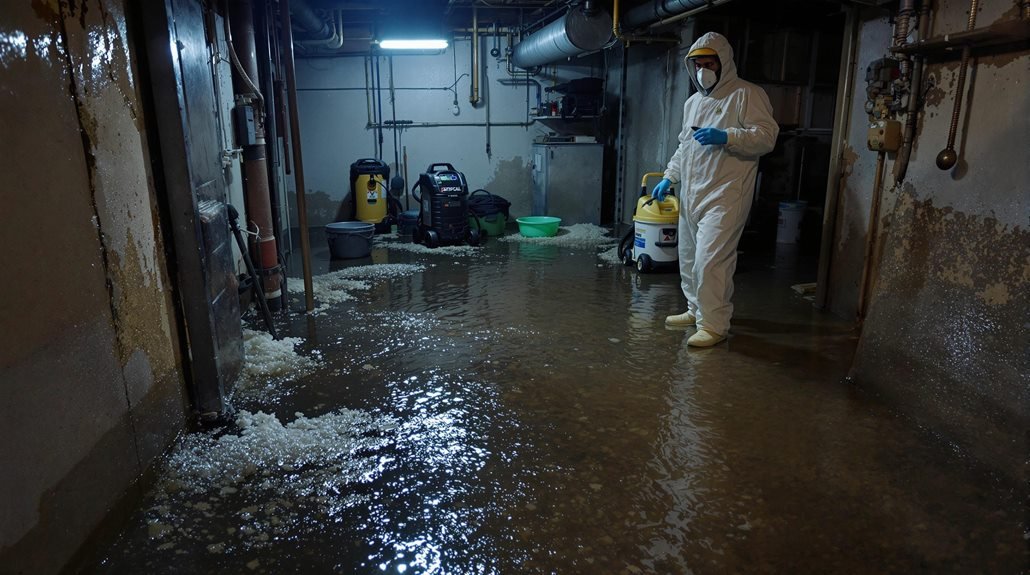It's interesting how you might have just experienced a minor plumbing issue and now you're considering the broader implications of sewage backups. These incidents can stem from various causes, like clogs or tree roots, leading to serious health risks and costly property damage. Knowing the potential hazards is crucial, but understanding the effective restoration solutions is just as significant. What happens when you find yourself facing a backup, and how can you act swiftly to protect your home and health?
Common Causes of Sewage Backups

Sewage backups can occur due to several common causes, and understanding these can help you prevent costly damage. First up, clogged drains are usually the culprit. If you've been ignoring that slow drain, it might just be plotting a revenge plot with grease buildup and hair. Then there are tree roots, which have a sneaky way of invading your sewer line. They're like nature's little ninjas, wreaking havoc on your plumbing.
Faulty plumbing is another prime suspect; a leaky pipe can turn into a gushing geyser quicker than you can say "plumber's bill." Heavy rainfall can likewise overwhelm your system. When the skies open up, and your sewer line can't handle it, you might find yourself in a watery predicament. And let's not forget about aging infrastructure and municipal issues—sometimes, the city's pipes are just as old as your grandma's favorite casserole recipe.
Poor maintenance can worsen all these issues. If you neglect your plumbing, don't be surprised when it throws a tantrum. Stay vigilant, keep your drains clear, and maybe lend a helping hand to those tree roots before they decide to throw a party in your sewer line!
Health Risks Associated With Sewage
Ignoring sewage backups can lead to significant health risks that shouldn't be overlooked. When you're faced with a sewage backup, you're not just dealing with a nasty smell; you're inviting a parade of bacterial infections into your life. These unwelcome guests thrive in the contaminated water, increasing the risk of diseases that can affect you and your loved ones. Toxic exposure isn't just a catchy phrase; it's a reality that can lead to acute respiratory issues, particularly if the sewage spreads airborne pathogens.
But wait, there's more! The mental health impact can be as challenging as the physical. Imagine the stress of worrying about water contamination infiltrating your home and community. It can create a ripple effect, affecting sanitation practices and public health in your neighborhood. Long-term effects of exposure to sewage can linger, impacting not just your physical well-being but likewise your peace of mind.
To keep the community safe, it's essential to act swiftly and restore proper sanitation practices. Don't let a minor inconvenience turn into a major health crisis. After all, who needs extra drama in their life?
Property Damage From Sewage Backups

When sewage backups occur, they can severely compromise your property's structural integrity, leading to costly repairs. Furthermore, exposure to contaminated water poses significant health hazards, making it crucial to address these incidents swiftly. By understanding the risks and implementing preventive measures, you can safeguard both your property and your health.
Structural Integrity Threats
A sewage backup can pose significant threats to the structural integrity of your property, leading to extensive and costly damage. When sewage infiltrates your home, it may signal underlying issues like pipe deterioration. Over time, the pipes can corrode or crack, allowing waste to escape and wreak havoc on your precious abode. Think of it as your plumbing's way of throwing in the towel—embarrassing, isn't it?
Moreover, the water from a backup can seep into the foundation, causing foundation weakness. A compromised foundation isn't just a small issue; it's akin to hosting a house party with a leaky roof—nobody wants to be there when it collapses! If you don't address these issues promptly, you might find yourself facing expensive repairs down the line.
To prevent structural damage, regular inspections of your plumbing system are crucial. Look for warning signs like slow drains or unpleasant odors. Implementing preventative measures, like routine maintenance and timely repairs, can save you from a soggy fate. After all, it's better to address a small leak than to deal with your home transforming into a swimming pool!
Health Hazards Exposure
Sewage backups don't just threaten your property's structure; they likewise create serious health hazards. When you're knee-deep in murky water, it's not just your shoes at risk—bacterial contamination and toxic fumes are lurking, ready to ruin your day. Understanding the dangers is essential for your safety.
Here's a quick look at the health risks associated with sewage backups:
| Health Risk | Description | Prevention |
|---|---|---|
| Bacterial Contamination | Exposure to harmful bacteria can lead to infections. | Wear protective gear and avoid contact. |
| Toxic Fumes | Gases like hydrogen sulfide can cause respiratory issues. | Ventilate the area and wear masks. |
| Mold Growth | Excess moisture can lead to mold, which triggers allergies. | Act quickly to dry the area. |
| Pest Infestation | Sewage attracts pests like rodents that carry diseases. | Seal entry points and maintain cleanliness. |
To tackle these hazards, act fast! Call in professionals who know how to restore your home safely. Remember, it's always better to be safe than sorry—especially when it involves the contents of your toilet!
Prevention Strategies for Homeowners
Implementing effective prevention strategies can greatly reduce the risk of sewage backups in your home. First off, regular drain maintenance is essential. Keep debris, grease, and foreign objects out of your drains, unless you fancy your kitchen sink turning into a mini swamp. Use strainers to catch food particles and hair, and don't forget to flush your drains with hot water occasionally—think of it as a spa day for your plumbing.
Next, schedule routine plumbing inspections with a qualified professional. They can spot potential issues before they become disasters. A small leak today can turn into a full-blown fountain tomorrow, and trust me, you don't want to be the neighborhood's latest water feature.
Additionally, be mindful of what you flush. Toilet paper is fine, but anything else is like sending an invitation to a sewage party you definitely don't want to host. Finally, consider installing backflow valves. It's like giving your plumbing a bouncer to keep unwanted guests out of your home.
Restoration Solutions and Techniques

When sewage backups do occur, quick and effective restoration is key to minimizing damage and guaranteeing safety. You'll want to act fast, so grab your restoration equipment and prepare to get your hands a little dirty—figuratively, of course! Start by identifying the source of the backup and containing it, preventing further spread of the unpleasantness.
Next, deploy the right cleaning methods. High-powered vacuums designed for sewage removal are your best friend here. They can suck up the mess while you maintain a safe distance—because who wants to get too close to that? After the bulk is removed, thorough disinfection is crucial. Use industrial-grade cleaners that can tackle bacteria and odors.
Don't forget about drying! Specialized drying equipment helps eliminate moisture, preventing mold and mildew from crashing the cleanup party. Monitor humidity levels with hygrometers to confirm you've banished every last drop. Finally, assess the affected materials—some might need replacing, while others can be salvaged with a little elbow grease. Remember, the goal isn't just to clean; it's to restore your space to its former glory without leaving any lingering stench behind!
When to Call Professionals
Recognizing warning signs of a sewage backup is vital for your health and safety. If you notice persistent odors, slow drainage, or unexpected water pooling, it's time to assess the risk and consider professional help. Proactive prevention and maintenance can mitigate issues, but when problems arise, timely intervention is necessary to protect your home and well-being.
Warning Signs to Observe
Sewage backups can escalate quickly, so it's crucial to stay alert for warning signs that indicate it's time to call in the professionals. First, if you notice slow drainage in multiple fixtures, it's like your plumbing's way of sending you an SOS. This could mean drainage issues lurking beneath the surface. Don't ignore those gurgling sounds; they might be your pipes' way of begging for help.
Next, unpleasant odors wafting from your drains aren't just your imagination—they're a signal that something's off. If you spot water pooling in your yard, it might not be a new swimming pool you wanted to build. It could be a sign of serious plumbing problems.
Health Risk Assessment
You might not realize it, but the presence of sewage in your home can pose significant health risks that require immediate professional intervention. Contaminated water isn't just a minor inconvenience; it can bring a buffet of bacteria and pathogens right into your living room. When you notice foul smells or see water pooling where it shouldn't, it's time to act—preferably before your home turns into a science experiment gone wrong.
Ignoring these issues can lead to severe health problems, including gastrointestinal illnesses and respiratory issues. Don't let your sanitation practices slide; professionals are trained to assess these risks accurately and can tackle the mess with proper equipment and expertise. You might think you can DIY your way through it, but trust us, this isn't your weekend plumbing project.
If you suspect sewage contamination, call in the pros. They'll evaluate the situation, contain the contaminated water, and restore your home to a safe environment. Remember, it's better to be safe than sorry—especially when your health is on the line. So, don't hesitate; take action and keep your home healthy!
Prevention and Maintenance Tips
Regular maintenance is crucial for preventing sewage backups and ensuring your plumbing system functions efficiently. By performing routine inspections and proper drainage maintenance, you can catch potential issues before they turn into messy disasters. Here are some tips to keep your plumbing in tip-top shape:
- Inspect your pipes and connections for leaks or cracks regularly.
- Avoid flushing anything other than toilet paper—no, that includes those "flushable" wipes!
- Keep grease and food particles out of your kitchen sink; your drainage system isn't a trash can.
- Install a backwater valve to prevent sewage from flowing back into your home.
- Know when to call the pros—if you notice slow drains or foul odors, it's time to act!
Taking these precautions doesn't just save you from a smelly situation; it likewise saves you money in the long run. Remember, your plumbing system is like a finely tuned instrument. When it starts to sound off, don't ignore it! A little humor can lighten the load, but a sewage backup is no laughing matter. Stay vigilant, and your plumbing will reward you with smooth sailing!
Frequently Asked Questions
What Are the Signs of a Sewage Backup?
You'll notice signs like gurgling drains, slow water flow, and unpleasant odors. Regular plumbing maintenance and preventive measures can help catch issues early, ensuring you don't end up with a nasty surprise in your home!
Can I Clean up Sewage Myself?
You can attempt sewage cleanup yourself, but prioritize personal safety. Wear protective gear, ventilate the area, and follow sewage cleanup tips. If it feels overwhelming, don't hesitate to call in the professionals—your sanity's worth it!
How Does Weather Affect Sewage Backups?
Imagine heavy rainfall drenching your yard, snowmelt flooding streets. Groundwater saturation can lead to infrastructure failure and drainage issues. Urban runoff's no joke; it amplifies sewage backups, turning your home into an unwelcome water park.
What Should I Do if Sewage Enters My Home?
If sewage enters your home, act quickly! Call for emergency response to mitigate health hazards. Wear protective gear, contain the area, and don't panic—after all, it's just a really unfortunate plumbing mishap!
Are Sewage Backups Covered by Homeowners Insurance?
Whether sewage backups are covered depends on your insurance policies and coverage limits. You might want to check your specifics—after all, no one wants to find out their "oops" moment comes with a hefty bill!
Conclusion
To summarize, sewage backups pose serious threats to both health and property. By knowing the common causes and implementing preventive measures, you can safeguard your home and family. Think of your plumbing system as the lifeblood of your household; neglecting it can lead to chaos. When issues arise, swift restoration solutions are essential. Don't hesitate to call professionals when needed—after all, it's better to act now than to deal with the aftermath later.


Recent Comments